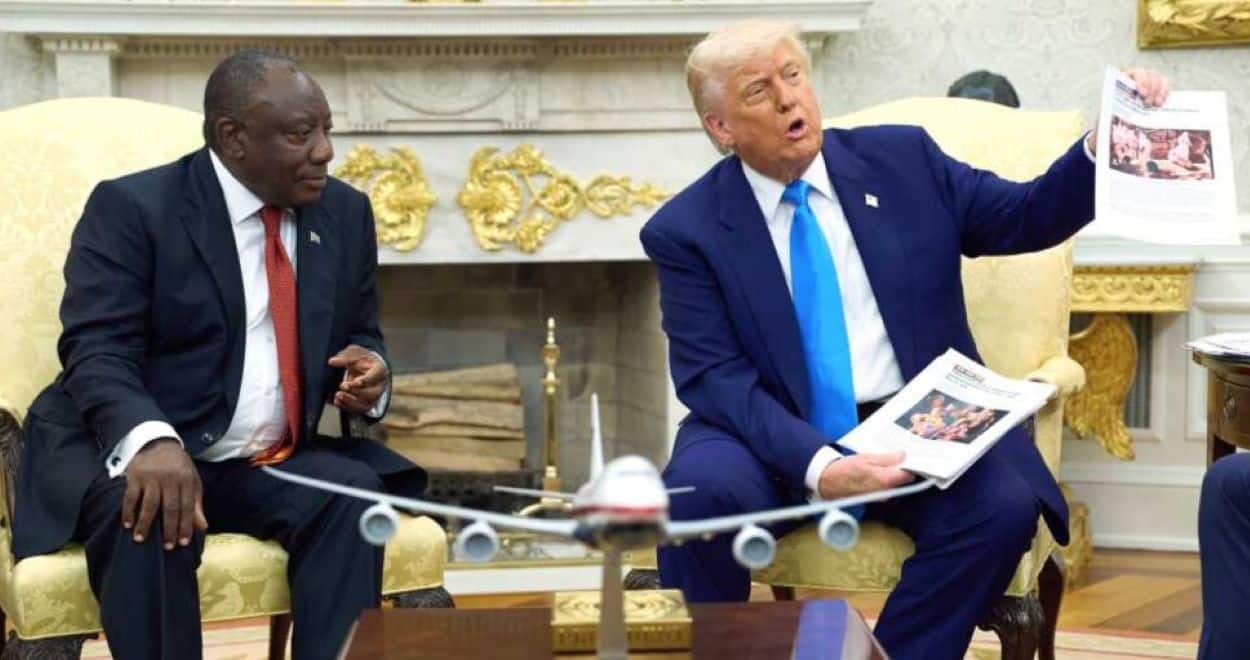On May 21, 2025, U.S. President Donald Trump confronted South African President Cyril Ramaphosa during a tense White House meeting, presenting debunked claims of a “white genocide” against Afrikaner farmers. The exchange, reminiscent of Trump’s February 2025 clash with Ukrainian President Volodymyr Zelenskyy, highlighted strained U.S.-South Africa relations amid Trump’s policies targeting the African nation.
Trump, echoing a conspiracy theory amplified by advisor Elon Musk, alleged widespread persecution of white South Africans, citing violence and land seizures. In a dramatic move, he dimmed the Oval Office lights to play a video featuring opposition politician Julius Malema singing the apartheid-era song “Kill the Boer” and images of white crosses, which Trump claimed marked graves of murdered farmers. Reuters reported that the 2020 protest video misrepresented the crosses as symbolic, not actual graves. Trump also displayed news articles, repeatedly saying “death, death,” to emphasise his claims.
'There no just genocide in South Africa,’ President Cyril Ramaphosa said, after the US President Donald Trump alleged persecution of South Africa's white minority during the White House talks https://t.co/o91SR8oMbM pic.twitter.com/pvI1HT00Jx
— Reuters (@Reuters) May 22, 2025Ramaphosa, seeking to reset bilateral ties, firmly rejected the allegations. “There is just no genocide in South Africa,” he stated, noting that the video’s content, including Malema’s song, did not reflect government policy. He emphasised that crime affects all South Africans, with Black individuals comprising the majority of victims, citing 26,232 murders nationwide in 2024, only 44 linked to farming communities, per South African police data.
US President Trump tried to embarrass his visiting South African counterpart Ramaphosa, by bringing up farm murders and land appropriation in South Africa. Here's how one of the tense exchanges between the two leaders unfolded in the Oval Office: pic.twitter.com/bpvpBGmS08
— DW News (@dwnews) May 21, 2025The meeting followed months of friction. Trump halted U.S. aid to South Africa in February 2025, expelled its ambassador, and criticised its International Court of Justice case against Israel. He also granted refugee status to 59 white Afrikaners, a move Ramaphosa argued did not meet refugee criteria, while restricting immigration from other nations like Afghanistan and Haiti. The U.S. condemned South Africa’s 2024 Expropriation Act, which allows rare land seizures for public interest, though no such actions have occurred, and landowners can challenge orders in court.
Trump spent much of his meeting with South African President Cyril Ramaphosa rambling about disproven claims and conspiracy theories.
Ramaphosa was not interested in indulging Trump’s delusions about his country.
Story: https://t.co/zNMrrKW56z pic.twitter.com/qqSpf8maAv
— Rolling Stone (@RollingStone) May 21, 2025Ramaphosa, accompanied by white South African golfers Ernie Els and Retief Goosen and billionaire Johann Rupert, aimed to focus on trade, as the U.S. is South Africa’s second-largest trading partner. He gifted Trump a book on South African golf courses to lighten the mood. Despite Trump’s claim that Afrikaners face genocide, Ramaphosa pointed out, “If there were Afrikaner farmer genocide, these three gentlemen would not be here,” highlighting their presence.
Ramaphosa’s Response and Broader Implications
Remaining composed, Ramaphosa invoked Nelson Mandela’s approach to dialogue, acknowledging South Africa’s crime challenges but clarifying that Black South Africans are disproportionately affected. Johann Rupert supported this, noting crime’s universal impact. South African Minister John Steenhuisen, also white, clarified that Malema’s views represent fringe opposition, not government policy. Three South African courts have ruled the “Kill the Boer” song a historical chant, not incitement to violence.
President Trump confronts South Africa's Ramaphosa at White House with video backing claims of white genocide; shows clips of Black South Africans, gravesites. pic.twitter.com/bdnYMk6iCF
— The Standard Digital (@StandardKenya) May 21, 2025The confrontation, broadcast live, drew praise for Ramaphosa’s diplomacy from South African leaders like Fikile Mbalula, though the Economic Freedom Fighters criticised his delegation’s handling of the genocide myth. The meeting underscored Trump’s racially polarising narrative, with posts on X reflecting divided sentiments, some amplifying the debunked genocide claim. Ramaphosa later emphasised trade outcomes, announcing discussions on critical minerals and U.S. liquefied natural gas imports.
The clash risks deterring foreign leaders from White House visits, given Trump’s pattern of public confrontations. South Africa, a multi-party democracy since 1994, continues to address apartheid’s legacy, with whites owning 72% of farmland despite being 7% of the population.






